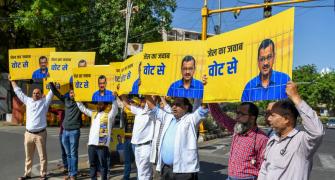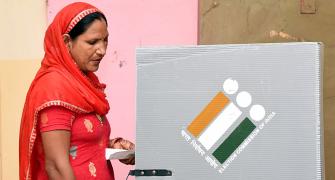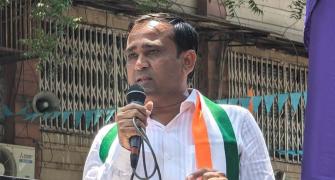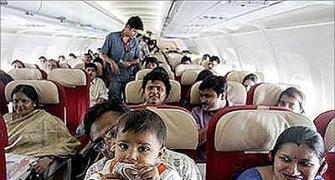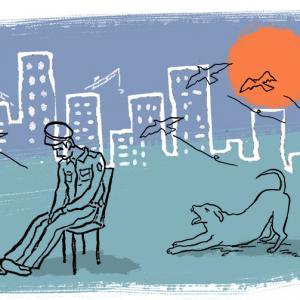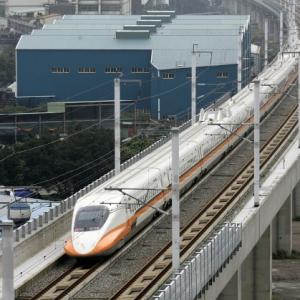Lush agricultural lands have turned parch as groundwater levels deplete to new lows, and wells and water reservoirs go dry.
While the administration points to deficient rainfall as a reason, experts and activists say the drought is mostly man-made.

Every day before 5 am and after 10 pm, 40-year-old K Kasturi and her husband leave their home in Mylapore, Central Chennai, in search of water with eight vessels.
If they are lucky, they may be able to fetch water from hand pumps or taps in five vessels after walking 1-1.5 km.
This is the only source of water to drink, cook, wash, clean and bathe for them.
This is common across Chennai and various parts of Tamil Nadu, where lush agricultural lands have turned parch as groundwater levels deplete to new lows, and wells and water reservoirs go dry.
The water levels in Chennai’s four main reservoirs have been at their lowest in seven decades, with the current quantities cumulatively adding only up to 1.3 per cent of the total capacity.
This is the fifth lowest quantity of water recorded in the last 74 years, making it one of the worst droughts the city has witnessed.
Private water suppliers are making the most of the crisis and have begun charging Rs 2,500-6,000 per load of tanker in the city, depending upon the capacity of the vehicle.
While the administration points to deficient rainfall as a reason, experts and activists say the drought is mostly man-made.
They fear the drought this year could be worse than what was witnessed in 2017.
The average rainfall in the state during last year was 81 cm as against the normal rainfall of 96 cm.
The state should have received 10 cm rainfall during January.
Of the 32 districts in the state, 24 have been declared drought-hit.
The major reservoirs in Tamil Nadu have a 26 per cent deficiency, even though live storage in six major reservoirs - Lower Bhavani, Mettur (Stanley), Vaigai, Parambikulam, Aliyar and Sholayar - is comparatively high than last year’s levels.
As of May 16, 2019, live storage in these reservoirs was seen at 0.753 billion cubic metres (bcm) of the total capacity of 4.229 bcm, as against last year’s 0.419 bcm on May 17, 2018.
The districts of Tanjore, Trichy, Thiruvarur and Nagapattinam, which span 1,400,000 acres of the delta region of the Cauvery, account for 47 per cent of river and canal irrigation.
These are also home to the paddy cultivators of Tamil Nadu.
The eight Cauvery delta region districts make up for 45.4 per cent of the state’s paddy production, with Thiruvarur and Tanjore contributing the highest - 10.7 per cent and 9.9 per cent, respectively - making them the chief rice suppliers to the state granaries and responsible for food security.
But cultivation is drastically hit as the delta regions suffer from an inadequate flow of water from the Mettur dam, which is the only source for paddy.
The inactive South West monsoon broke the agricultural calendar, and ruined the plantations of 90-day crops, say experts.
“There was about 27 per cent deficiency in rains this time.
"Usually, water levels start declining only after April in the delta region, but this time it started in February itself.
"There is no water in tanks, ponds and lakes in the region,” says Swamimalai R Vimalanathan, general secretary of the Thanjavur District Kaveri Farmers’ Protection Association.
With a shortage of surface water, farmers in Thanjavur are skipping the Kuruvai crop.
Groundwater level depletion is a problem as borewells go up to or above 500 metres.
The Public Works Department (PWD) says the average groundwater level in Thanjavur has declined to 3.58 metres in April 2019 from 3.1 metres last year.
Ten to twelve sugar mill units in Tamil Nadu have stopped crushing cane because of a lack of availability of sugar cane.
P R Pandian, general secretary of Tamilaga Cauvery Vivasayigal Sangam (Tamil Nadu Cauvery Farmer's Organisation), says in 2011, Tamil Nadu farmers worked in nearly 500,000 acres of kuruvai (short-term crops like paddy).
“Today there is no short-term crop being farmed because of the severe drought.
"In some years, the farmers were able to grow the crop in Samba season.
"During these eight years (2011-19), around 10-20 per cent of the acreage in agriculture has come down,” he said.
Chief Minister K Palaniswami’s government has set aside Rs 823.64 crore to address the water scarcity issue in the state.
But, farmers and activists feel not enough has been done and allege that the water scarcity is a result of lack of planning and implementation of proper measures to save the available water effectively.
They noted that nearly 259 tmcft (thousand million cubic feet) of floodwater was wasted by draining into the sea annually and in the last decade, groundwater levels across the city have dropped by 85 per cent.
However, even if the state receives an average rainfall, without proper measures to save the available water by cleaning the water reservoirs and other storages and efficient methods to improve the groundwater level, it will continue to reel under water shortage, say experts.
Part 2: From cattle to crops, drought playing havoc in Gujarat
Photograph: PTI Photo





